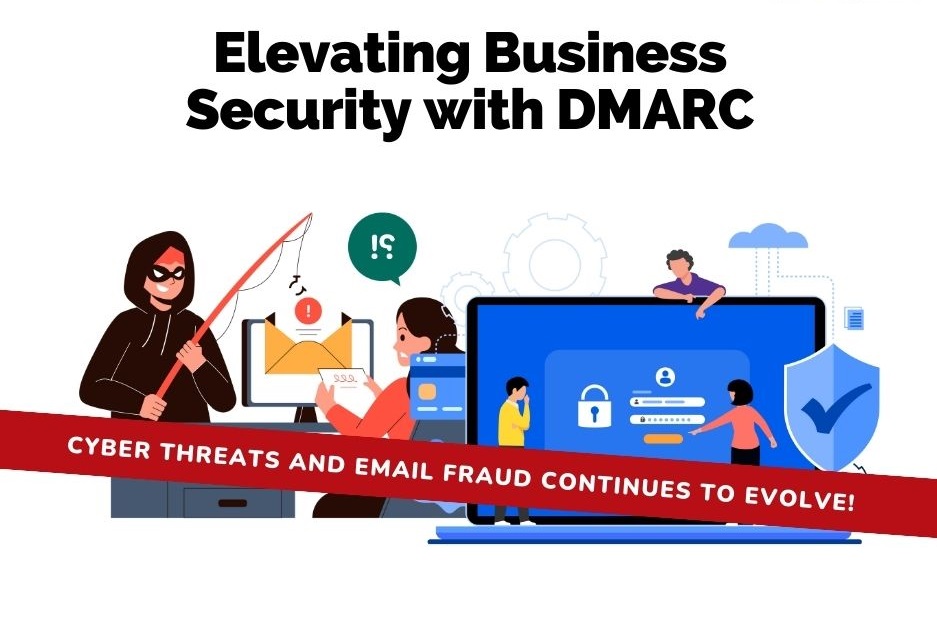
In an era where cyber threats loom large and email remains a critical communication channel for businesses, safeguarding against phishing attacks and email fraud has become paramount. One such technology that is gaining increasing attention is DMARC – Domain-based Message Authentication, Reporting, and Conformance. Let’s delve into what DMARC is and how it can significantly impact your business’s email security posture.
What is DMARC?
DMARC, standing for Domain-based Message Authentication, Reporting, and Conformance, is an email authentication protocol. It adds an additional layer of security to your organisation’s email infrastructure by allowing domain owners to specify how their incoming email should be authenticated. DMARC works alongside existing email authentication mechanisms such as SPF (Sender Policy Framework) and DKIM (DomainKeys Identified Mail) to help prevent email spoofing, phishing attacks, and domain impersonation.
How Does DMARC Work?
At its core, DMARC enables domain owners to publish policies indicating how recipient email servers should handle messages that claim to come from their domain but fail authentication checks.
These policies include:
Monitor (p=none): In this mode, DMARC operates in a monitoring-only capacity. It allows domain owners to observe and gather data on email authentication failures without taking any enforcement actions. This mode is often used during the initial deployment phase to assess the impact on legitimate email traffic.
Quarantine (p=quarantine): Messages that fail DMARC authentication are delivered to the recipient’s spam or junk folder. This policy provides a middle ground, allowing domain owners to gradually implement stricter enforcement measures while minimising the risk of false positives.
Reject (p=reject): This is the most stringent DMARC policy. Messages that fail authentication checks are outright rejected by the recipient’s email server, preventing them from reaching the recipient’s inbox. While effective at blocking unauthorised senders, implementing a “reject” policy requires careful configuration and monitoring to avoid disrupting legitimate email traffic.
Importantly, a Delivery Report is generated & sent back to the Sender organisation on if the email was delivered & if not why it wasn’t. This can be used to fix problems with email at the Sender’s business. It is extremly important for business’ IT provider to monitor these reports in an ongoing manner as they are not a set & forget service
Impact on Business
Implementing DMARC can have several significant benefits for businesses:
Enhanced Email Security: By authenticating incoming emails, DMARC helps prevent domain spoofing and email fraud, reducing the risk of phishing attacks and data breaches.
Protecting Brand Reputation: Email spoofing and phishing attacks can damage your brand’s reputation and erode customer trust. DMARC helps protect your brand identity by ensuring that only authorised senders can use your domain for email communication.
Improved Email Deliverability: Implementing DMARC can positively impact your email deliverability rates by reducing the likelihood of your legitimate emails being marked as spam or phishing attempts.
Regulatory Compliance: In industries where data security and privacy regulations are stringent, such as finance, healthcare, and government, implementing DMARC can help demonstrate compliance with industry standards and regulations.
Conclusion
In an increasingly digital and interconnected world, email security is not something businesses can afford to overlook. DMARC provides a robust framework for enhancing email authentication and protecting against email fraud and phishing attacks.
By implementing DMARC policies tailored to your organisation’s needs, you can bolster your email security posture, safeguard your brand reputation, and foster trust with your customers and partners.
As cyber threats continue to evolve, investing in technologies like DMARC remains critical for ensuring the integrity and security of your business communications.
Remember, protecting your business from email fraud starts with taking proactive steps to implement robust email security measures like DMARC so get in touch with us at Aureole Systems to chat about how we can protect your business!


